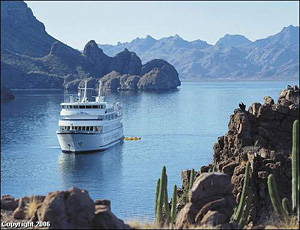 |
 |
 |
 Travel & Outdoors | October 2006 Travel & Outdoors | October 2006  
Whaleside on the Sea of Cortez
 Betsa Marsh - Cincinnati Enquirer Betsa Marsh - Cincinnati Enquirer


| | With a maximum of 102 passengers, the Spirit of Endeavour is more flexible physically and philosophically than larger cruise ships. It can maneuver into tight inlets and shallow waters that floating palaces can't. (Cruise West) |
Armed with cameras instead of harpoons, my shipmates and I are in peaceful search of the flip of a mammoth tail or the explosive clearing of a blowhole. We cruise in the maternity ward of the great gray whale, looking for mothers and newborns in the briny warmth of the Baja California Sur lagoons.

Suddenly, a baby threads through the waves, three times for each of its mother's long loops. Following in our little wooden pangas, we soon fall into the 1-2-3 waltz rhythm of their motion, gliding side by side in the shallow waves.

The gray whales are enjoying the warm lagoons of Bahia Magdalena, a protected inlet on the Pacific coast of Mexico's Baja peninsula. They are nearly 6,000 miles from the frigid waters of their summer home, the Bering and Chukchi seas off Alaska, halfway through the longest annual migration of any mammal.

The panga ride through the nursery is a day's adventure on the Sea of Cortez's itinerary of Cruise West. The whales, who stay in Baja for their December-to-April calving season, are one of the biggest draws for the line's small ship, Spirit of Endeavour. The captain scouts for wildlife in the warm, calm waters of the Sea of Cortez day and night. Everything on board stops when a whale surfaces or dolphins leap in the ship's wake.

One incredible morning, blue whales, the largest animals ever known to live on Earth, break through the water and clear their blowholes outside the harbor of Puerto Escondido. Humpback and pilot whales spout nearby. The entire Spirit of Endeavour focuses on nothing but whales -- everyone on deck is listening for the telltale explosion of a spouting, as loud as a slit tire on a tractor-trailer -- until we have to pull away for our next port.

"I didn't know the whales were that far up the gulf, but now I've built in time for that area in next week's schedule," says Capt. Dave Landis.

Captain and crew continuously refine the itinerary, trying to keep a balance between cultural and natural history while allowing time for the serendipity of wildlife viewing. "We want to give our guests the best show we can," Landis said.

With a maximum of 102 passengers, Endeavour is more flexible physically and philosophically than larger cruise ships. It can maneuver into tight inlets and shallow waters that floating palaces can't, and the crew is more than ready to tack and change course when they have an animal sighting.

In seven years of sailing this route, the Endeavour crew has learned not only the ways of the whales, but also the intricacies of the Sea of Cortez, more formally called the Gulf of California. The waters were not heavily traveled, so the charts weren't as complete as those in the United States. Each year, the navigational staff added new information to the charts, relying heavily on local knowledge.

Endeavour is one of five small ships in the Sea of Cortez, declared a biosphere preserve by the Mexican government in 1978. The sea, created when the Baja peninsula broke away from the Mexican mainland millions of years ago, is significantly warmer than the Pacific and supports a diverse marine ecosystem. The isolation of the desert peninsula, twice the length of Florida, has also created dozens of endemic plants and animal species found nowhere else on Earth. Baja is rightfully called the "Galapagos of the North."

And Baja is one of the few places on Earth, like Galapagos, where you can see blue-footed boobies and magnificent frigate birds (magnificent is part of the name). The ship slows in the morning near a national wildlife refuge, two volcanic islets called Los Islotes. We scan the guano-stained crags for boobies, gulls, pelicans and frigate birds as sea lions cavort in the swell.

Struck by the interest in these birds and pinnipeds, the crew quickly offers close-up excursions to Los Islotes that afternoon in the ship's inflatable boats. People who may never get to the remote Galapagos can go home with photos of blue-footed boobies.

The crew also gathers comments about the cultural and historical stops along the cruise, such as the first of the Catholic missions in tiny Loreto and the waterfront shops in La Paz. The crew in Baja and at Cruise West's headquarters in Seattle uses each season's questionnaires and comment cards to help decide the next year's stops.

Unlike some cruise lines, such as Princess, which urge their passengers not to eat or drink anything from a local vendor during Mexican shore excursions, Cruise West works with two local restaurants to offer the flavor of Baja. After verifying that the water is filtered and the vegetables are washed to U.S. standards, Cruise West serves its clients an open-air lunch of grouper and shrimp in Puerto Lopez Mateos and a riverside pig roast in Mulege. Although veterans of bouts of "tourista" were initially leery of local cooking, no one became ill after either meal. And very few passengers were willing to skip the tender lobster tails of the captain's dinner, caught that day off the ship's anchorage in La Paz.

By its more intimate, casual nature, small-ship cruising often feels more in touch with the local waters and ports than its big-ship cousins. The narrow and relatively shallow Sea of Cortez seems ideal for this 102-passenger ship, our own floating nature lab. | 
 | |
 |



